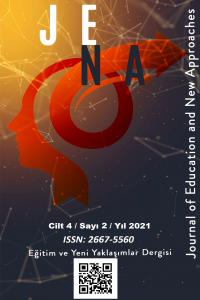Research Article
Aim & Scope
ISSN: 2667-5560
Journal of Education and New Approaches (JENA) aims to share original academic studies in the field of education and bring a new perspective to this field with an interdisciplinary approach. In addition, it purposes to contribute to the field of education by publishing original studies, depicting current picture of educational process, pointing out the problem and proposing solutions.
Journal of
Education and New Approaches is a peer reviewed international journal that
began to be published as of the year 2018 in Turkish and English languages. The
manuscripts such as theoretical and experimental researches, survey researches,
proceedings, case studies, short reports, activities, biographies, book reviews
and letters to the editor are published after they were evaluated as “it can be
published as it is” by the referees. The manuscripts which are prepared in line
with the spelling rules are sent to the referees for review by the
editor-in-chief. This journal uses DOUBLE-BLIND
REVIEW throughout the review process.
Based on the feedbacks of the referees, the editorial and advisory
boards make the final decision. The authors take all kinds of responsibility (scientific,
professional, legal, ethical etc.) of the articles published in our journal. The
copyright of the published articles belongs to the journal and cannot be used
without providing reference. In order to establish the scientific communication
between researchers, the articles which are described below and are not
published elsewhere are accepted in Turkish and English but the abstract should
be published in English or Turkish as well.
The studies conducted in the field of EDUCATION are accepted by the journal.
Author Guidelines
The manuscripts sent to Journal of Education and New Approaches should conform to the style of the Publication Manual of the American Psychological Association (APA), 7th Edition in referencing and using footnotes.
For Authors
Manuscripts submitted to the journal should be:
Research studies encompassing original scientific findings,
Studies conveying implementation examples with a scientific approach.
Compilation studies comprehensively evaluating significant developments on a specific subject
Manuscripts should be electronically uploaded to the system at the Journal of Education and New Approaches.
The manuscripts
cannot be published anywhere else and cannot be presented as proceedings
without the permission of the editorial board.
All or a part of the article cannot be used anywhere without reference.
The authors in the article should build consensus on the order of names.
Spelling
Rules
While submitting
your manuscript, you may use the sample template. Please click the link below
for sample article.
Sample ArticleTemplate
Files should be attached to the manuscripts
1) The articles are reviewed together with the report of plagiarism IThenticate,
Turnitin, etc. If the plagiarism report is not added, the editorial board has
the right to deny the manuscript by checking it IThenticate software whether it
covers plagiarism.
2) Copyright ReleaseForm
The copyright of the articles is released by filling and signing the form on the journal website. The Copyright Release Form should be downloaded, signed and uploaded to the system as a PDF. Manuscripts of the authors who do not submit this form cannot be published.
CONTACT
Assoc. Dr. Fuat Serkan SAY
Telephone: +90-5323860809 (Editor-in-chief)
E-mail: serkansay@mersin.edu.tr
Ethical Principles and Publication Policy
PUBLICATION ETHICS
Studies with reviewers are works that concretise and support the scientific method. At this point, it is important that all stakeholders of the process (authors, readers, researchers, publishers, reviewers and editors) comply with the standards of ethical principles. Journal of Education and New Approaches (JENA) expects all stakeholders to have the following ethical responsibilities within the scope of the publication ethics:
Responsibilities of the Authors
1. The manuscript sent for publication should not be published before or simultaneously sent to another journal for review. Each submission can be done following the completion of the previous one. The work published in another journal cannot be submitted to JENA.
2. The authors must make full and accurate references and/or citations when they are using/citing other works. In citations and reference list, the writing rules of APA 7 should be followed.
3. The situations and relationships of all works submitted for publication that constitute a conflict of interest, if any, should be stated explicitly.
4. Raw data or additional information might be requested from the authors within the framework of the evaluation process. In this case, the authors should be ready to present the required data and information to the editorial board.
5. The authors must have the document showing that they have the right to use the data used in the manuscript and the necessary permissions for research/measurement tools and analysis.
6. The ethical board approval must be obtained and presented in the study with the related information.
7. When the authors notice a mistake or an error related to their manuscript in the evaluation process or when it is published or early-accessed, they are obliged to inform the editorial board or the publisher and to cooperate with the editor(s) in the process of revision and withdraw.
Responsibilities of the Reviewers
1. The reviewers should agree to evaluate studies related to their area of expertise only.
2. The reviewers should evaluate the manuscripts in an objective and confidential way.
3. If they think that there is a conflict of interest, the reviewers should refuse to review the manuscript and inform the journal editor.
4. In accordance with the principle of confidentiality, the reviewers should destroy the manuscripts they have evaluated after the reviewing process. They can only use the final versions of the manuscripts only after they are published.
5. The reviewers should make the evaluation objectively and only in relation to the content of the manuscript. They should not allow race, gender, religious beliefs, political views or commercial concerns to influence their evaluation.
6. The reviewers are expected to use a polite language when giving feedback. They should avoid personal or offensive comments that include hostility, slander and insults.
7. The reviewers are expected to carry out and complete the evaluation within the specified timing and in compliance with the ethical responsibilities listed above.
Responsibilities of the Editors
1. All manuscripts are evaluated on the basis of their intellectual content regardless of the authors’ gender, race, ethnicity, religion or political views.
2. Personal information about the manuscripts is kept confidential.
3. The conflict of interest, if any, observed for the manuscript should be explained.
4. The Editorial Board takes the responsibility of making editorial decisions for the submitted manuscripts on the evaluation of the manuscripts, the journal policies and the items that are prohibited against plagiarism and copyright infringements.
PUBLICATION POLICY AND PROCESS
Journal of Education And New Approaches (JENA) has a free of charge publishing policy by adopting the principle that offering scholarly research free of charge to the scientific community will increase the dissemination of information worldwide and contribute more to the development in the field of education.
All published articles are available Open Access (OA). OA journals are scientific journals that reach readers online and without any legal or technical barriers. OA offers the possibilities of unlimited access and reuse. Therefore, OA creates the network to reach the widest possible audience, disseminate all works and rebuilding them.
Publishing Language
Studies in Turkish and/or English are accepted for the journal. At the end of the articles in Turkish, there should be a summary of 500-800 words in English. The Summary section should include the headings “Introduction, Methods, Results and Discussion”.
Publishing Frequency
JENA is published twice a year (June and December). The editorial board can change the publishing frequency of the journal.
Evaluation Process of Manuscripts
JENA adopts DOUBLE BLIND REVIEWING policy. The journal editor and the editorial board decide on publication of a manuscript according to the views and comments of the reviewers. The submitted manuscripts are not returned to the author(s) whether they are published or not. All kinds of responsibilities of the manuscripts (scientific, professional, legal and ethical) published in the journal belong to the authors. The copyrights of the published articles belong to the journal and they cannot be transferred without reference. In order to establish scientific communication between researchers, the manuscripts the qualification of which are described below and which have not been published elsewhere are accepted in Turkish or English.
The manuscripts that have not been published elsewhere or submitted to another journal simultaneously are accepted for evaluation. The manuscripts submitted to the journal are firstly evaluated by the editors and/or the editorial board. The manuscripts that pass this preliminary evaluation are then sent to at least two reviewers who are experts in their fields without the authors’ names and addresses. Whether or not the manuscript will be published in the journal is decided according to the results of the reviewers’ comments and decisions. In the light of the reviewers’ decisions, corrections might be requested from the authors or the manuscript might be unconditionally rejected. The manuscript that is accepted to be published is sent to the corresponding author for a last check. The manuscripts that are revised in the light of the requested corrections and resent by the corresponding author within 10 days are published in the journal.
• The manuscripts submitted to other journals simultaneously will not be accepted.
• The submissions with content outside the scope of JENA will not be considered for evaluation.
• The manuscripts are expected to contain original and genuine content. They should not published previously.
• All manuscripts are expected to contain a genuine content. They should not be published or reviewed in another journal before.
• The manuscripts are sent to at least two independent reviewers.
• All submissions will be evaluated as double blind reviewing.
• All editorial decisions are made by the editors of the journal based on the reports of the reviewers.
• All manuscripts and reviewers’ reports are achieved and the manuscripts will not be returned even if they are not published.
• Authors who would like to change their mind and withdraw their submission need to apply to the editorial board.
• Authors are responsible for the text quality of their manuscripts.
• JENA is free of charge, so the journal will not pay royalties to the authors.
• A signed Copyright Transfer Agreement Form should be submitted with the manuscript.
Archive Policy – LOCKSS
JENA uses the LOCKSS programme to allow libraries to form permanent achieves for preservation and restoration purposes, so that participating libraries could create a distributed archiving system. If you would like to get more information about LOCKSS, please visit this website.
Based at Standford University Librairies, LOCKSS programme offers award-winning, low-cost, open-source digital preservation tools to provide libraries and publishers with access to permanent and authoritative digital content. The LOCKSS programme (https://www.lockss.org/) is a library-led preservation system built on the principle of “securing multiple copies”. The LOCKSS programme improves and supports libraries by using open source end-to-end digital preservation software.
The LOCKSS programme allows librarians in each institution to access and preserve the e-content they subscribe to and restore the printed purchasing model that they are familiar with.
Global LOCKSS Network preserves today’s e-magazines and e-books for tomorrow’s readers. The network is also a proven protection approach that empowers both libraries and publishes in a genuine way. The network is managed by Stanford University Libraries LOCKSS programme. For more details, you can visit the LOCKSS programme website.
Privacy Stament
Names and e-mail addresses on the journal’s website will be used for stated purposes of this journal, and will not be used for other purposes or other platforms.
Indexes
Other Indexes
Journal Boards
Publishing Editor

Editor
Co-Editors

Section Editors

Ahmet Erol is a research assistant at the Department of Preschool Education, Pamukkale University, Denizli, Turkey. His research interests include environmental education, self-regulation in early childhood, STEM education in early childhood, social skills in preschool period. Some of his articles have been published in the following journals: Current Psychology, Death Studies, European Early Childhood Education Research Journal, Early Child Development and Care, The Journal of Educational Research.


Dr. Korkmaz conducts research on English as a Second Language, Language Acquisition, Applied Linguistics and Educational Linguistics, Educational Readiness, Quality Assurance in Higher Education, Accreditation of Undergraduate and Graduate Education Programs.




Araştırmacı ilk ve orta öğrenimini Muğla’da tamamladı. Muğla Sıtkı Koçman Üniversitesi Sosyal Bilgiler Eğitimi Anabilim Dalından mezun oldu. Aynı birime 50/d kadrosu kapsamında; daha sonra Pamukkale Üniversitesine Öğretim Üyesi Yetiştirme Programı (ÖYP) kapsamında araştırma görevlisi olarak atandı Muğla Sıtkı Koçman Üniversitesi Sosyal Bilgiler Eğitimi Anabilim Dalında yüksek lisansını tamamladı. Pamukkale Üniversitesi İlköğretim Doktora Programı kapsamında sosyal bilgiler eğitiminde doktorasını tamamladı. Aynı kurumda doktor araştırma görevlisi ve doktor öğretim üyesi olarak görev yaptı. Yine aynı kurumda doçent doktor olarak görevine devam etmektedir. Araştırmacının akademik ilgi alanlarında sosyal bilgiler eğitiminde topluma hizmet ederek öğrenme, gönüllülük, STEM ve orman okulu yaklaşımları yer almaktadır.




Language Editors

Dr. Korkmaz conducts research on English as a Second Language, Language Acquisition, Applied Linguistics and Educational Linguistics, Educational Readiness, Quality Assurance in Higher Education, Accreditation of Undergraduate and Graduate Education Programs.
Layout Editor

Editorial Board











Prof. Ali Fuat Arıcı completed his undergraduate education in the Department of Classroom Teaching at Süleyman Demirel University (1998), and his master's degree (2002) and doctorate (2005) in Turkish Teaching at Atatürk University. After working as a teacher at the Ministry of National Education for 10 years, he was appointed to Dumlupınar University, Faculty of Education, Department of Turkish Education as an Assistant Professor in 2006. Arıcı, who became an Associate Professor in 2011, became a Professor in the field of Turkish Education in 2017. Prof. Arıcı currently works for Yıldız Technical University, Faculty of Education, Department of Social Sciences and Turkish Education. Prof. Dr. Ali Fuat Arıcı has many articles published in journals indexed in national and international directories. Prof. Arıcı's research areas include Turkish language and literature education, and Turkish education.

1979 yılında Burdur’da doğdu. Pamukkale Üniversitesi Eğitim Fakültesi’nden mezun oldu (1999). Aynı üniversitenin Sosyal Bilimler Enstitüsü’nde yüksek lisansını (2003) ve doktorasını (2012) tamamladı. 2018 yılında doçent, 2024 yılında profesör oldu. Hâlen Pamukkale Üniversitesi Eğitim Fakültesi’nde öğretim üyesidir.

.















